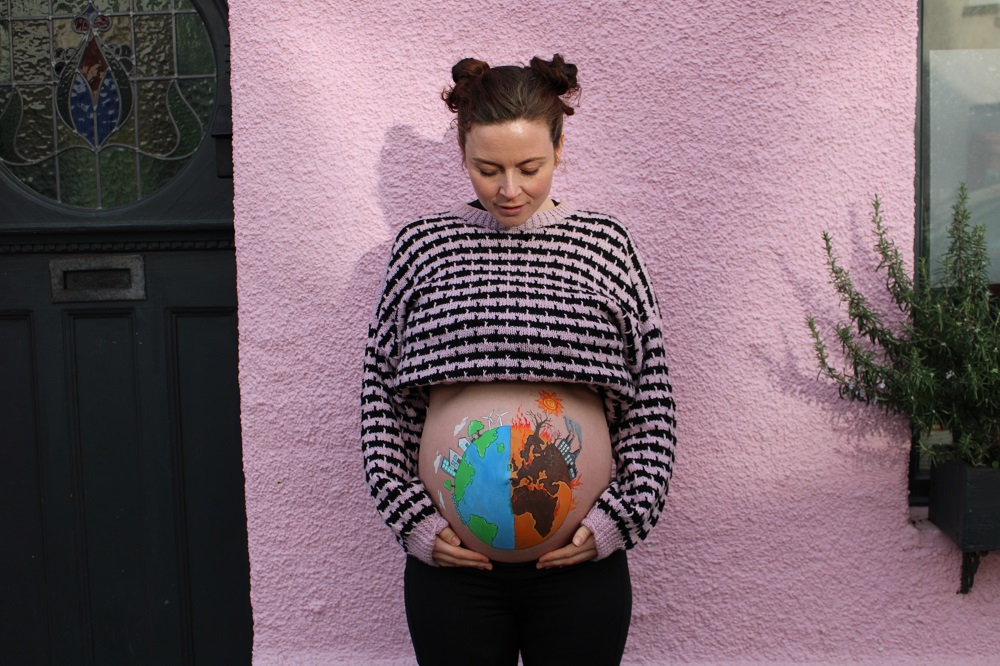Comedian reconciles parenthood with climate crisis in S4C documentary

Lowri Llewelyn
Until recently, a commitment not to birth her own baby was the bread and butter of stand-up comic Eleri Morgan.
However, she now finds herself struggling to reconcile an unexpected pregnancy with the climate crisis which weighs so heavily on her mind.
The program is produced by female-founded and female-focused production company Little Bird Films, and directed by Lindsay Walker of BAFTA winner The Welshman.
In the program, Eleri visits the Green Man festival in the Bannau Brycheiniog—named the UK’s most sustainable summer event 2022—to learn the prognosis for future generations.
She also visits the coastal Ceredigion village of Borth, which experts predict will be underwater by 2050 if sea levels continue to rise at current rates.
Borth isn’t the only Welsh location under threat from global warming, the residents of the Gwynedd village of Fairbourne being dubbed by the media the UK’s very first ‘climate refugees’ following a statement by Gwynedd Council that it would ‘not be safe or sustainable to defend Fairbourne’ following a planned decommission.
However, the tide may be turning following fierce pushback from residents who say they will not leave their homes and demand government action.
Positive change
Among those having their say in the documentary include the younger generation, who show Eleri the steps they’re already taking towards creating positive change. Others making a difference include a family living off-grid and a pioneering nappy recycling facility ‒ located right here in Wales.
According to the last global study by Eunomia in 2017, Wales is a world leader in recycling, coming in third only behind Germany and Taiwan. Figures released in 2022 also showed Wales was the only UK nation to uphold stellar recycling rates during the pandemic, with other UK nations all seeing a drop in performance.
However, in our culture of consumption, how will the carbon footprint of Eleri’s baby compare to a baby born elsewhere?
In her search for answers she’ll glean expert tips from Dr Prysor Williams of Bangor University, who has been studying the effects that humans are having on the planet. Is the answer as simple as choosing not to have children?
She’ll also explore the options available to new parents in an effort to minimise the carbon footprint of her unborn child, from buying preloved prams to throwing eco-friendly baby showers.
Eleri told Nation.Cymru, “On the one hand it was wonderful and truly life-affirming to meet these people putting so much effort into creating a safe future for us all. On the other hand, it made me so angry to see these individuals, rather than the government— who aren’t doing half enough in my opinion—taking responsibility for the climate emergency.
“I’m so grateful to them but they shouldn’t be the only ones trying to save us!’
Watch Dyfodol i Dewi now on S4C Clic. English subtitles available.
Support our Nation today
For the price of a cup of coffee a month you can help us create an independent, not-for-profit, national news service for the people of Wales, by the people of Wales.







Very difficult topic to discuss. From the new parent perspective and the abstainer perspective. I’ve studied environmental issues academically for years and this is by far the most challenging thing to talk about for several reasons. Child rearing under ‘normal’ circumstances is a private, familial matter. It’s not hard-wired into the average person to interfere or voice their opinion in strangers family planning decisions. That would be a good way to feel the brunt of homo sapien at its most primal and ferocious. It’s not a topic that typically lends itself to reasonable and impartial discussion. On top of which… Read more »
The reasoning and general logical thrust of your commentary here are exemplary. Commenters on Nation would do well to model their approach on this comment. I’m 100 % with the left-leaning western political sphere when they advocate for many changes to help mitigate or counter anthropogenic climate change. Not on this issue, however. There is a reason why the utilitarian, cold and actuarial approach to birthrates and family still seems a tad ghoulish to many of us – the data simply isn’t analysed properly. The issue with what you put forward here, despite being very well formulated, hinges on 1… Read more »
Sure. I have no issue with your counter argument. It needs to be talked about. I think you have some good points and population control is a very complicated topic. Whole books have been written on the subject. I would like to say that I wasn’t being Wales specific or covering the issue on a global scale in my post. I would say I was referencing Western difficulties with population control and my intention was to keep it light (as light as it can be). Obviously it is a global issue and each country has its own prominent points to… Read more »
Questions that come to me from this response: What exactly is your area of expertise and the relevant positions held/institutions represented? Could you provide any rationale behind your position that birthrates/populations in Western nations are too high (no need for any specific data or references, just some deductive reasoning or another form of logical explanation – if ‘x’ remains unexplained, even poorly, one cannot take seriously any extrapolation from ‘x’)? Can you name a non-market based/non-capitalist nation that is doing better than “Western”/free-market-oriented/capitalist nations on any metric pertaining to climate change or overall quality of life? Can you posit a… Read more »